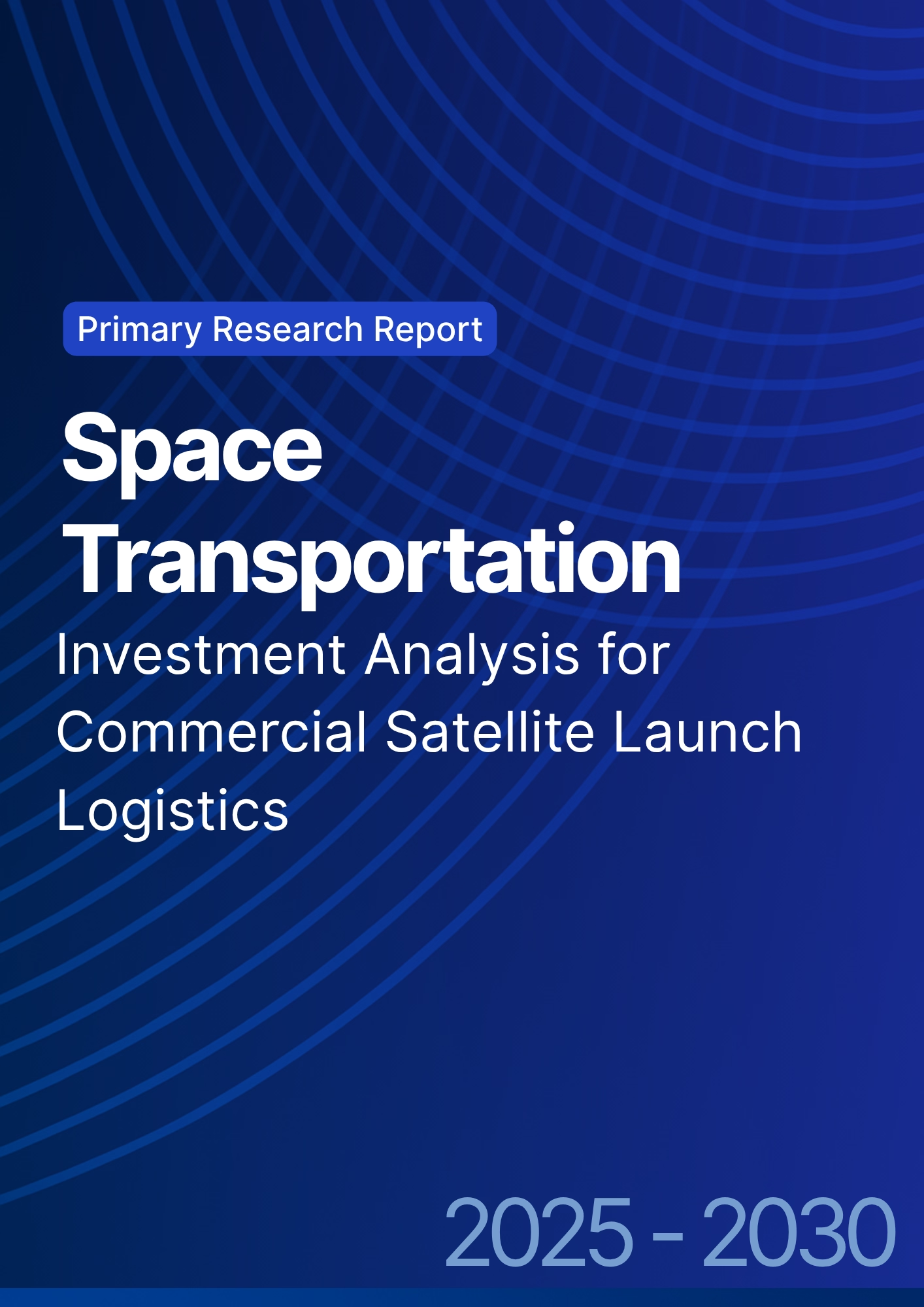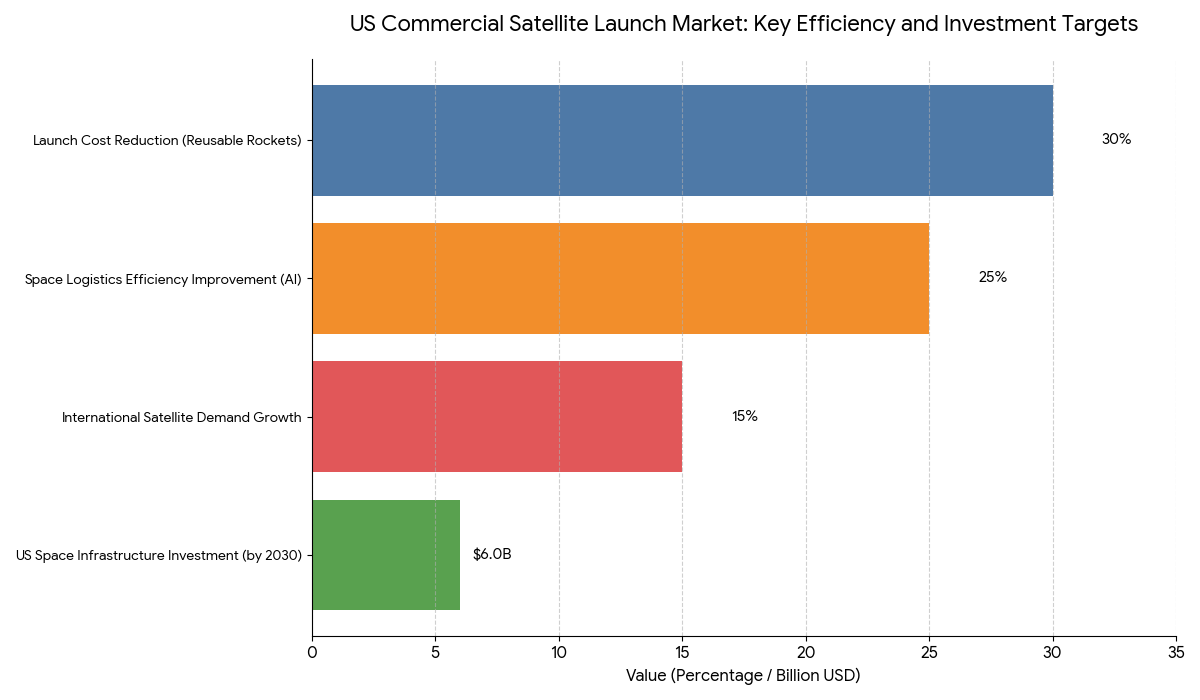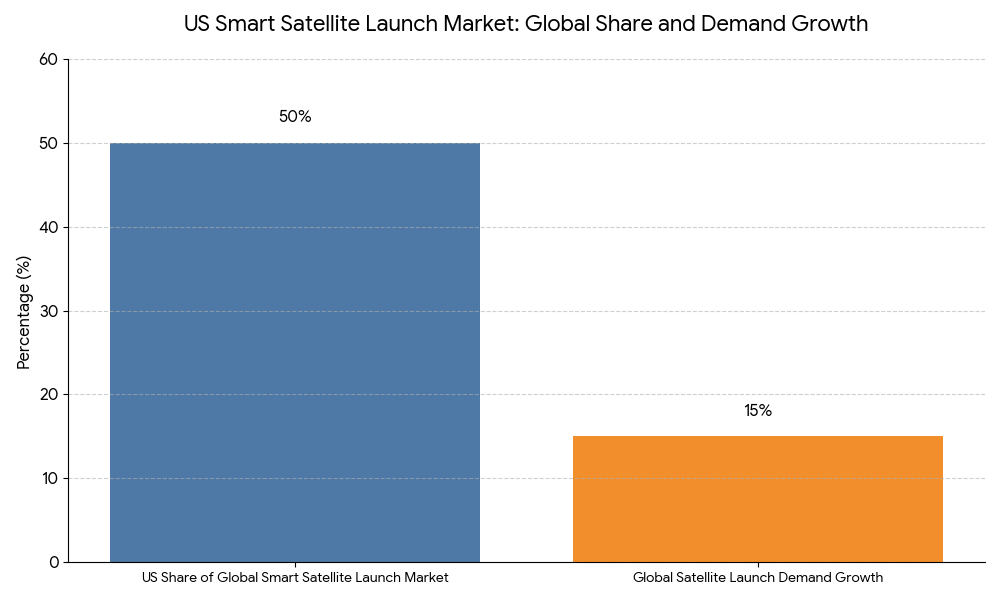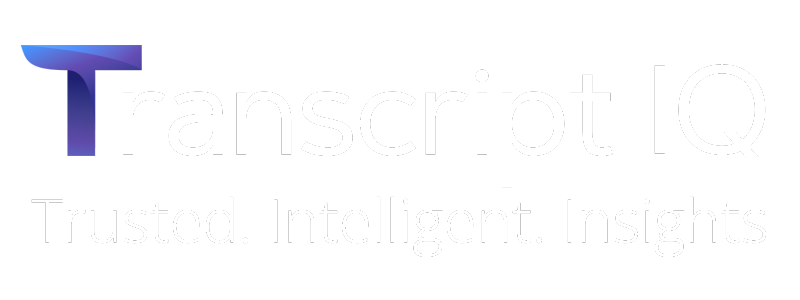

68 Circular Road, #02-01 049422, Singapore
Revenue Tower, Scbd, Jakarta 12190, Indonesia
4th Floor, Pinnacle Business Park, Andheri East, Mumbai, 400093
Cinnabar Hills, Embassy Golf Links Business Park, Bengaluru, Karnataka 560071
Connect With Us
Space Transportation: Investment Analysis for Commercial Satellite Launch Logistics
The space transportation market for commercial satellite launch logistics in the USA is projected to grow from $9.2B in 2025 to $27.8B by 2030 (CAGR 24.9%), driven by increased satellite demand, commercial spaceflight advancements, and public-private partnerships. Key players like SpaceX and Blue Origin are leading the charge with reusable launch vehicles, cutting costs per launch and improving supply chain resilience. By 2030, 40% of satellite launches in the US will be commercialized, with low Earth orbit (LEO) missions dominating. Government incentives and international demand for satellite services will further fuel market growth.

What's Covered?
Report Summary
Key Takeaways
- Market size: $9.2B → $27.8B (CAGR 24.9%).
- 40% of satellite launches in the US to be commercialized by 2030.
- Cost per launch reduced by 30% with reusable launch vehicles.
- Government incentives driving $6B investment in space infrastructure.
- LEO missions to account for 50% of market demand.
- Private sector investment in satellite launch technology to surpass $15B.
- Space tourism and commercial space applications to increase market penetration.
- International satellite demand expected to drive 15% growth.
- AI-driven satellite tracking to improve logistics efficiency by 25%.
- Reusable rocket technology to reduce operational costs by 40%.
Key Metrics
Market Size & Share
The space transportation market for commercial satellite launches is expected to grow from $9.2B in 2025 to $27.8B by 2030, achieving a CAGR of 24.9%. The increased demand for satellites from industries like communications, earth observation, and space tourism is driving market expansion. Reusable launch vehicles are expected to reduce costs per launch by 30%, making satellite launches more affordable and accessible to private companies and governments alike. By 2030, 40% of satellite launches in the US will be commercialized, with low Earth orbit (LEO) missions accounting for 50% of the market share. The US government will invest approximately $6B in space infrastructure, further supporting private-public partnerships and innovation in space transportation technology. This growth will create new opportunities in international satellite demand and private sector investment, with $15B+ projected to be invested in satellite launch technologies by 2030.
Market Analysis
The commercial satellite launch market in the US is undergoing a significant transformation due to advancements in reusable rocket technology and growing demand for satellite services. By 2030, LEO missions will dominate the market, driven by the growing need for broadband communication, earth monitoring, and global positioning systems (GPS). SpaceX, Blue Origin, and Rocket Lab are leading the charge in satellite launch services, with reusable rockets reducing the cost of launches by 30%. AI-powered satellite tracking will also play a crucial role in optimizing space logistics, improving efficiency by 25%. The US government’s space policy, including initiatives like Artemis and the National Space Transportation Policy, is expected to drive $6B in space infrastructure investments by 2030. Meanwhile, international satellite demand is forecasted to grow by 15%, further boosting the need for commercial satellite launches.

Trends & Insights
- Reusable Rockets: Reduced launch costs by 30% through reusability.
- AI-Powered Tracking: Enhances satellite logistics and tracking efficiency by 25%.
- LEO Market Dominance: 50% of market demand for low Earth orbit missions.
- Government Initiatives: $6B investment in space infrastructure by 2030.
- Private Sector Growth: $15B investment in satellite launch technologies.
- Space Tourism Impact: Contributing to the growth of commercial satellite services.
- International Demand: 15% growth in global satellite demand.
- Blockchain Integration: Increasing adoption for secure satellite communication.
- Commercialization of Satellite Launches: 40% of launches will be commercialized by 2030.
- Environmental Sustainability: Reduction of CO₂ emissions in rocket launches with reusable tech.
These trends highlight the disruptive innovations transforming satellite launch logistics, reducing costs, and improving operational efficiency in space transportation.
Segment Analysis
The space transportation market for commercial satellite launches is segmented into reusable launch vehicles (40%), satellite tracking systems (25%), AI-powered logistics (20%), and satellite-based services (15%). Reusable launch vehicles account for the largest share, making up 40% of the total market investment, while satellite tracking systems and AI-powered logistics platforms are expected to comprise 45% of the market combined. These technologies will enhance the efficiency and security of satellite launches, while ensuring real-time monitoring of satellite positioning and performance. The market for satellite-based services is also growing, driven by demand for communications, earth observation, and GPS. By 2030, AI and reusable technologies will significantly contribute to reducing the cost and increasing the capacity for satellite launches in the global market.
Geography Analysis
The USA is leading the smart satellite launch market with a 50% market share, due to advancements in reusable rockets, AI-based logistics, and real-time tracking systems. Private companies, particularly SpaceX, Blue Origin, and Rocket Lab, dominate the satellite launch service market, making the US a global hub for commercial satellite services. International demand from Europe, Asia, and the Middle East is increasing, with global satellite launches expected to grow by 15%. By 2030, the US will remain the largest player in the space transportation industry, contributing to global satellite launch services through both private sector investments and government space policies.

Competitive Landscape
Key players in the space transportation market for commercial satellite launches include SpaceX, Blue Origin, Rocket Lab, Virgin Galactic, and Northrop Grumman. SpaceX leads the market with its reusable Falcon 9 rocket and Starship technology, reducing costs per launch and increasing payload capacities. Blue Origin is focused on developing autonomous space flight technology, while Rocket Lab specializes in small satellite launches. Other companies like Lockheed Martin and Boeing are investing in AI-powered launch systems and satellite management technologies to expand their reach in the commercial satellite space. The US government’s ongoing support through NASA’s Artemis program and the National Space Transportation Policy will further fuel the growth of commercial space transportation in the next decade.
Report Details
Proceed To Buy
Want a More Customized Experience?
- Request a Customized Transcript: Submit your own questions or specify changes. We’ll conduct a new call with the industry expert, covering both the original and your additional questions. You’ll receive an updated report for a small fee over the standard price.
- Request a Direct Call with the Expert: If you prefer a live conversation, we can facilitate a call between you and the expert. After the call, you’ll get the full recording, a verbatim transcript, and continued platform access to query the content and more.


68 Circular Road, #02-01 049422, Singapore
Revenue Tower, Scbd, Jakarta 12190, Indonesia
4th Floor, Pinnacle Business Park, Andheri East, Mumbai, 400093
Cinnabar Hills, Embassy Golf Links Business Park, Bengaluru, Karnataka 560071
Request Custom Transcript
Related Transcripts
$ 1350


68 Circular Road, #02-01 049422, Singapore
Revenue Tower, Scbd, Jakarta 12190, Indonesia
4th Floor, Pinnacle Business Park, Andheri East, Mumbai, 400093
Cinnabar Hills, Embassy Golf Links Business Park, Bengaluru, Karnataka 560071













